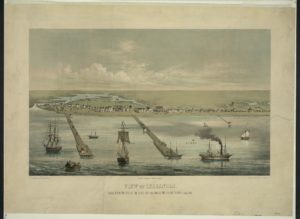It’s been said of some towns that, if you’re not paying attention when you drive by, you’re going to miss it. This can be said of Indianola, which today is a ghost town situated on Matagorda Bay.
Indianola sits approximately 91 miles northeast of Corpus Christi, and 144 miles southwest of Houston. From 1844 to 1875, it was once a major Texas port city, second only to Galveston. It was the chief port through which European immigrants came to settle in Texas.
Its location served it well. Indianola was the eastern end of the military road to San Antonio, Austin, and Chihuahua, Mexico. It also served as a starting point for the shortest overland route to San Diego and the Pacific Coast in an era before cars and highways, the Panama Canal, and cross-country aviation.
The Spanish explorer Alonso Álvarez de Pineda led an expedition to the site in 1519. The French explorer René Robert Cavelier, Sieur de LaSalle, began a settlement there in 1685. It also served as an Indian trading point.
The town was founded in 1846 as Indian Point, and became known as a deep-water port during the Mexican War. It changed its name to Indianola in 1849 and prospered, eventually reaching a population of about 5,000 people by 1871.
Indianola’s growth and prosperity were not to last, however.
A hurricane in 1875 partially destroyed the town. Residents worked to rebuild the community, though on a smaller scale. Another hurricane and a fire, in 1886, finished the destruction, and the town site was abandoned.
Though Indianola is a ghost town today, it has been remembered in both literature and music.
The writer Louis L’Amour wrote a novel, Matagorda, which was set in and around Indianola. Bantam Books issued the book in print in 1985 and Matagorda has since been reissued as a Kindle e-book.
The singer/songwriter Charlie Robison wrote a song, Indianola, for his Life of the Party album, which was released in 1998. You can hear the song here.

